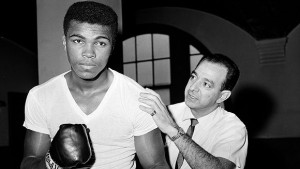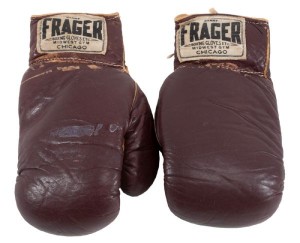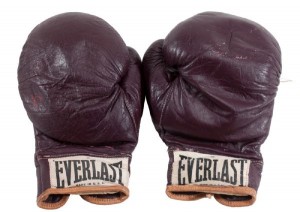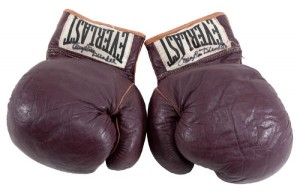THE ANGELO DUNDEE COLLECTION
If there had never been an Angelo Dundee – Angelo Mirena, really, since he changed his surname to honor a legendary pugilist from his youth – then Damon Runyon might have had to invent one. It’s inconceivable to think about the last half-century of professional boxing in the 20th century without placing Angelo Dundee in the corner of the ring and at the trainer’s table. The picture simply doesn’t work without his inclusion:, the hazy cigar smoke that seemed to hover over the Madison Square Garden ring, the booming call of the PA announcer as he struggles to be heard over a raucous, cheering crowd, even the obsequious fawning of a young Howard Cosell as he frantically elbows and bellows his way to his own curious stardom. None of that imagery congeals properly without placing Dundee squarely in the corner. His meteoric rise in the boxing world came just as the sport ascended atop a lofty perch of its own, ruling the sporting world from its throne at Madison Square Garden in New York City just as professional sports was learning to coexist and later capitalize on the revolutionary technology of television. For generations of boxing fans reared on the mystical smoke-filled aura that surrounded the Friday Night Fights from the Garden, Angelo Dundee became the composite imagery of who was in the fighter’s corner marshaling the fighter’s strength and durability and ministering to the horrific cuts and bruises that were part and parcel of the – thankfully – black-and-white broadcasts.
If his legendary status seemed to come from his long association with The Greatest, Cassius Clay and later Muhammad Ali – the truth is that his hold on postwar boxing lore and legend is even broader than that. A total of 15 world champions from just about any weight class you might imagine came under his tutelage and guidance from the corner, a roster of names that includes Carmen Basilio, Sugar Ray Leonard and George Foreman, among others.
And while the welterweight from Upstate New York Basilio was his first champion, it was certainly the linkage to Cassius Clay aka Muhammad Ali that propelled him to his iconic status of today. In a business/sport rife with elements that ranged from the eccentric and unpredictable to the downright unsavory and even criminal, the contrast with the genial, even collegial Dundee could not have been any more pronounced. There was a simple decency and forthrightness about the man that seemed to permeate every aspect of his dealings with everybody, from the bucket boy and wildly unpolished aspiring young boxer to the sultans and dignitaries in the front row. He brought an aura of class and inherent respectability to an arena that could use every drop of both that was available.
His amiability and unique nature were never more tested than when his young charge, Cassius Clay, embraced the Nation of Islam and changed his name to Muhammad Ali in the months leading up to his incredible 1964 knockout of the feared Sonny Liston, then the defending heavyweight champion and a prohibitive favorite against the brash young Olympic champion. At a time when a whole nation was struggling with its shameful legacy of racism and Jim Crow, just as the Civil Rights movement was taking hold across the land, what Muhammad Ali did in the early 1960’s would have been courageous and unthinkable for even the most liberal of Americans to comprehend, and the rough-and-tumble world of amateur and professional boxing was hardly a bastion of progressive thought, then or now.
But for Angelo Dundee, the tumult that seemed to envelope and expand exponentially around his young champion was of little interest: his focus was always on the sweet science, the mechanics and nuance of the sport, the extra preparation and heightened focus that would be vital in orchestrating so many championship triumphs. Ali himself took note of Dundee’s almost Zen-like acceptance of the controversy that surrounded him in those years, saying that his trainer never asked him why he had joined the Muslims, never questioned anything about it. In short, he remained in Ali’s corner, figuratively and literally, and the great champion never forgot it.
In 1967, with Ali stripped of his WBA Heavyweight crown because of his refusal to be drafted into service in Vietnam, Dundee was the mastermind in navigating an unprecedented tournament that managed to at least reinstall a new champion – another Dundee acolyte, Ali’s former sparring partner, Jimmy Ellis – and thus restore the sport to some semblance of normalcy amid one of its greatest moments of turmoil. And Dundee would be there when a triumphant Ali would return to his rightful throne atop the heavyweight ranks, and for the legendary Ali battles in the 1970’s with Joe Frazier.
This was an epic journey that had started with a discharge from the Air Force after World War II and a subsequent job as an aircraft inspector in his hometown of Philadelphia. The lure of the ring would take him quickly to New York City and the infamous Stillman’s Gym, and later to Miami Beach (with his older brother, boxing promoter Chris Dundee), along with countless destinations from every corner of the globe at a time when the mystique of a heavyweight championship fight captured the attention of a world still yet to be intertwined by cable television and the Internet. Boxing had that kind of power at one time, and Angelo Dundee was right smack dab in the middle of just about every historic moment in that amazing tableau.
Before his passing in February of this year at age 90, he would be feted by his sport and beyond, inducted into a half dozen halls of fame – including the International Boxing Hall of Fame ensconced in a tiny Upstate New York village – and ultimately installed into the pantheon of the sport’s greatest legends. There aren’t too many sports where the laurels of history are quite so prominently accorded to persons seemingly peripheral to the athletes. Angelo Dundee helped change all of that by making it clear the kind of impact that the trainer and a corner man could have. It seems inconceivable that we will ever see another of his stature again.




